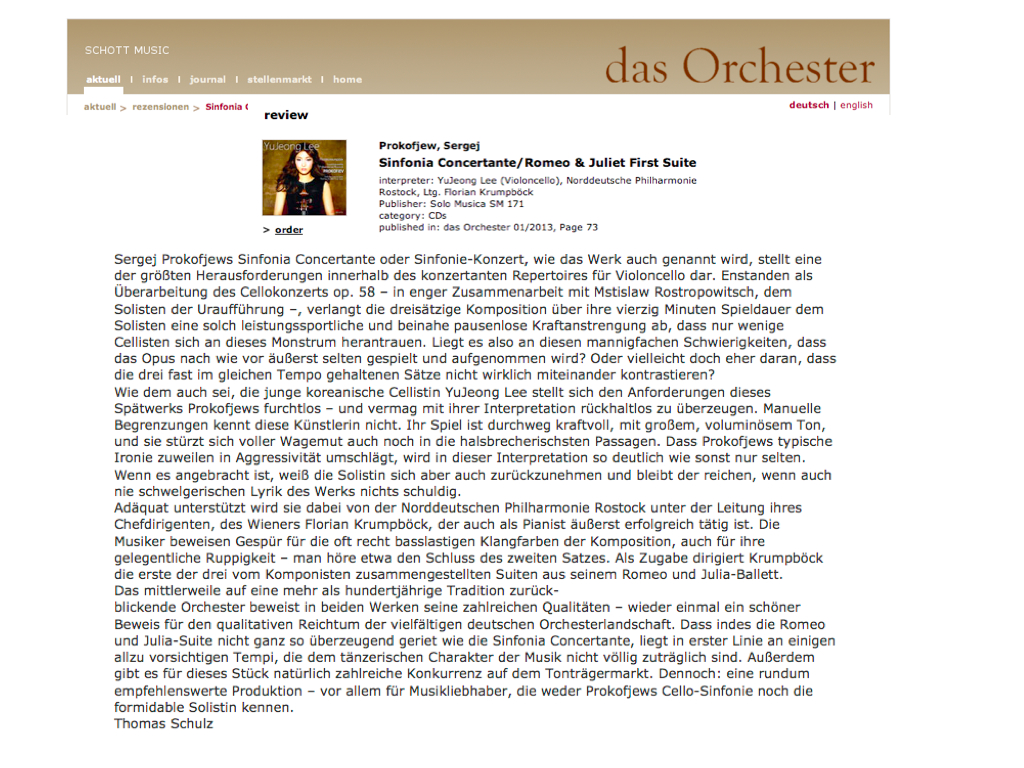DAS ORCHESTER
24-05-28 17:08

Sergei Prokofiev's Sinfonia Concertante represents one of the biggest challenges within the concert repertoire for violoncello. As it originated from a revised version of the Cello Concerto Op. 58 in close cooperation with Mstislav Rostropovich, this three-movement composition with a playtime of more than 40 minutes requires almost endless physical effort of the debut performance soloist to such an extent, that only very few cellists dare to play it.
So is it because of these many difficulties that this opus is played and recorded only on extremely rare occasions? Or is it maybe more to do with the fact that the three movements which are of a similar tempo do not really contrast with each other?
Whatever the answer to these questions, the young Korean cellist YuJeong Lee meets the challenges of Prokofiev’s late oeuvre fearlessly and manages to completely convince listeners with her very own interpretation of the piece. This extraordinary cellist does not know any technical limitations. Her performance is consistently strong, with a large and voluminous tone, and she masters even the most daring and difficult passages. The soloist emphasizes in her interpretation the fact of Prokofiev’s typical irony turning into aggressiveness in very rarely found clarity. However, the soloist also knows how to take herself back when appropriate, and fully expresses the rich yet never indulging lyricism of the piece. She is adequately supported by the Norddeutsche Philharmonie Rostock under its chief conductor, the Viennese Florian Krumpock, who is also a very successful pianist in his own right. The musicians prove a thorough understanding and sense for the often bass-heavy sound colours and occasional gruffness in this composition - just listen to the end of the second movement. As an encore, Krumpock conducts the first of the three suites that were compiled by the composer from his ballet “Romeo and Juliet”. WIth its tradition extending back for more than a century, the orchestra not only demonstrates its numerous qualities in both pieces but also sets yet another example for the richness of the quality and diversity of German orchestras.
There are of course numerous competing recordings on the CD market.
But this is still a most recommendable production - especially for all music lovers who are keen for an introduction to Prokofiev's Cello Symphony and this extraordinary soloist.
Thomas Schulz
Sergej Prokofjews Sinfonia Concertante oder Sinfonie-Konzert, wie das Werk auch genannt wird, stellt eine der großten Herausforderungen innerhalb des konzertanten Repertoires fur Violoncello dar. Enstanden als Uberarbeitung des Cellokonzerts op. 58 – in enger Zusammenarbeit mit Mstislaw Rostropowitsch, dem Solisten der Urauffuhrung –, verlangt die dreisatzige Komposition uber ihre vierzig Minuten Spieldauer dem Solisten eine solch leistungssportliche und beinahe pausenlose Kraftanstrengung ab, dass nur wenige Cellisten sich an dieses Monstrum herantrauen. Liegt es also an diesen mannigfachen Schwierigkeiten, dass das Opus nach wie vor außerst selten gespielt und aufgenommen wird? Oder vielleicht doch eher daran, dass die drei fast im gleichen Tempo gehaltenen Satze nicht wirklich miteinander kontrastieren?
Wie dem auch sei, die junge koreanische Cellistin YuJeong Lee stellt sich den Anforderungen dieses Spatwerks Prokofjews furchtlos – und vermag mit ihrer Interpretation ruckhaltlos zu uberzeugen. Manuelle Begrenzungen kennt diese Kunstlerin nicht. Ihr Spiel ist durchweg kraftvoll, mit großem, voluminosem Ton, und sie sturzt sich voller Wagemut auch noch in die halsbrecherischsten Passagen. Dass Prokofjews typische Ironie zuweilen in Aggressivitat umschlagt, wird in dieser Interpretation so deutlich wie sonst nur selten. Wenn es angebracht ist, weiß die Solistin sich aber auch zuruckzunehmen und bleibt der reichen, wenn auch nie schwelgerischen Lyrik des Werks nichts schuldig.
Adaquat unterstutzt wird sie dabei von der Norddeutschen Philharmonie Rostock unter der Leitung ihres Chefdirigenten, des Wieners Florian Krumpbock, der auch als Pianist außerst erfolgreich tatig ist. Die
Musiker beweisen Gespur fur die oft recht basslastigen Klangfarben der Komposition, auch fur ihre gelegentliche Ruppigkeit – man hore etwa den Schluss des zweiten Satzes. Als Zugabe dirigiert Krumpbock die erste der drei vom Komponisten zusammengestellten Suiten aus seinem Romeo und Julia-Ballett.
Das mittlerweile auf eine mehr als hundertjahrige Tradition zuruck-
blickende Orchester beweist in beiden Werken seine zahlreichen Qualitaten – wieder einmal ein schoner Beweis fur den qualitativen Reichtum der vielfaltigen deutschen Orchesterlandschaft. Dass indes die Romeo und Julia-Suite nicht ganz so uberzeugend geriet wie die Sinfonia Concertante, liegt in erster Linie an einigen allzu vorsichtigen Tempi, die dem tanzerischen Charakter der Musik nicht vollig zutraglich sind. Außerdem gibt es fur dieses Stuck naturlich zahlreiche Konkurrenz auf dem Tontragermarkt. Dennoch: eine rundum empfehlenswerte Produktion – vor allem fur Musikliebhaber, die weder Prokofjews Cello-Sinfonie noch die formidable Solistin kennen.
Thomas Schulz